Related Research Articles
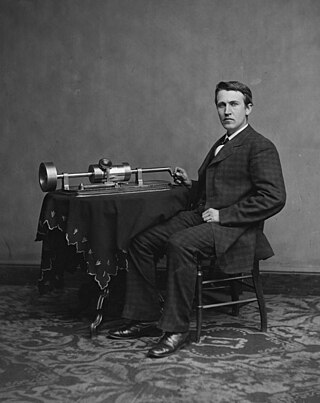
A phonograph, in its later forms also called a gramophone or since the 1940s called a record player, or more recently a turntable, is a device for the mechanical and analogue recording and reproduction of sound. The sound vibration waveforms are recorded as corresponding physical deviations of a spiral groove engraved, etched, incised, or impressed into the surface of a rotating cylinder or disc, called a "record". To recreate the sound, the surface is similarly rotated while a playback stylus traces the groove and is therefore vibrated by it, very faintly reproducing the recorded sound. In early acoustic phonographs, the stylus vibrated a diaphragm which produced sound waves which were coupled to the open air through a flaring horn, or directly to the listener's ears through stethoscope-type earphones.

Robert Lee Frost was an American poet. His work was initially published in England before it was published in the United States. Known for his realistic depictions of rural life and his command of American colloquial speech, Frost frequently wrote about settings from rural life in New England in the early 20th century, using them to examine complex social and philosophical themes.
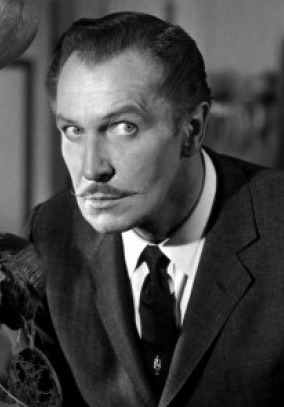
Vincent Leonard Price Jr. was an American actor, art historian, art collector, and gourmet cook. He appeared on stage, television, and radio, and in more than 100 films. Price has two stars on the Hollywood Walk of Fame, one for motion pictures and one for television.

Burl Icle Ivanhoe Ives was an American musician, singer and actor with a career that spanned more than six decades.

The Victor Talking Machine Company was an American recording company and phonograph manufacturer, incorporated in 1901. The company operated independently until it was purchased by the Radio Corporation of America (RCA) in 1929 and subsequently operated as the RCA Victor Division of the Radio Corporation of America.

CBS Radio Mystery Theater is a radio drama series created by Himan Brown that was broadcast on CBS Radio Network affiliates from 1974 to 1982, and later in the early 2000s was repeated by the NPR satellite feed.

The fireside chats were a series of evening radio addresses given by Franklin D. Roosevelt, the 32nd President of the United States, between 1933 and 1944. Roosevelt spoke with familiarity to millions of Americans about recovery from the Great Depression, the promulgation of the Emergency Banking Act in response to the banking crisis, the 1936 recession, New Deal initiatives, and the course of World War II. On radio, he quelled rumors, countered conservative-dominated newspapers, and explained his policies directly to the American people. His tone and demeanor communicated self-assurance during times of despair and uncertainty. Roosevelt was regarded as an effective communicator on radio, and the fireside chats kept him in high public regard throughout his presidency. Their introduction was later described as a "revolutionary experiment with a nascent media platform."

Within ghost hunting and parapsychology, electronic voice phenomena (EVP) are sounds found on electronic recordings that are interpreted as spirit voices. Parapsychologist Konstantīns Raudive, who popularized the idea in the 1970s, described EVP as typically brief, usually the length of a word or short phrase.

The Dickson Experimental Sound Film is a film made by William Dickson in late 1894 or early 1895. It is the first known film with live-recorded sound and appears to be the first motion picture made for the Kinetophone, the proto-sound-film system developed by Dickson and Thomas Edison. The film was produced at the "Black Maria", Edison's New Jersey film studio. There is no evidence that it was ever exhibited in its original format.
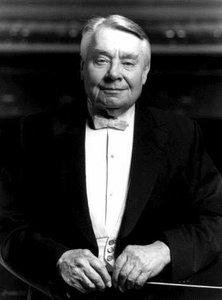
Robert Lawson Shaw was an American conductor most famous for his work with his namesake Chorale, with the Cleveland Orchestra and Chorus, and the Atlanta Symphony Orchestra and Chorus. He was known for drawing public attention to choral music through his wide-ranging influence and mentoring of younger conductors, the high standard of his recordings, his support for racial integration in his choruses, and his support for modern music, winning many awards throughout his career.

Willis Clark Conover, Jr. was a jazz producer and broadcaster on the Voice of America for over forty years. He produced jazz concerts at the White House, the Newport Jazz Festival, and for movies and television. By arranging concerts where people of all races were welcome, he is credited with desegregating Washington, D.C., nightclubs. Conover is credited with keeping interest in jazz alive in the countries of Eastern Europe through his nightly broadcasts during the Cold War.

The American Folklife Center at the Library of Congress in Washington, D.C. was created by Congress in 1976 "to preserve and present American Folklife". The center includes the Archive of Folk Culture, established at the library in 1928 as a repository for American folk music. The center and its collections have grown to encompass all aspects of folklore and folklife worldwide.

Sound recording and reproduction is the electrical, mechanical, electronic, or digital inscription and re-creation of sound waves, such as spoken voice, singing, instrumental music, or sound effects. The two main classes of sound recording technology are analog recording and digital recording.
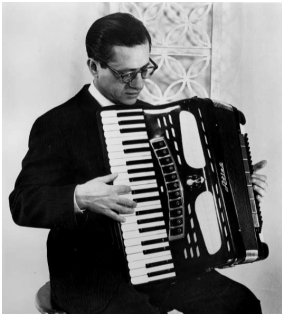
John Serry Sr. was an American concert accordionist, arranger, composer, organist, and educator. He performed on the CBS Radio and Television networks and contributed to Voice of America's cultural diplomacy initiatives during the Golden Age of Radio. He also concertized on the accordion as a member of several orchestras and jazz ensembles for nearly forty years between the 1930s and 1960s.

The National Recording Registry is a list of sound recordings that "are culturally, historically, or aesthetically significant, and/or inform or reflect life in the United States." The registry was established by the National Recording Preservation Act of 2000, which created the National Recording Preservation Board, whose members are appointed by the Librarian of Congress. The recordings preserved in the United States National Recording Registry form a registry of recordings selected yearly by the National Recording Preservation Board for preservation in the Library of Congress.

Michigan State University Libraries is the academic library system of Michigan State University in East Lansing, Michigan, United States. The library system comprises nine branch locations including the Main Library. As of 2021-22, the MSU Libraries ranked 26th among U.S. and Canadian research libraries by number of volumes and 7th among U.S. and Canadian research libraries by number of titles held.

Thomas A. Edison, Incorporated was the main holding company for the various manufacturing companies established by the inventor and entrepreneur Thomas Edison. It was a successor to Edison Manufacturing Company and operated between 1911 and 1957, when it merged with McGraw Electric to form McGraw-Edison.

Édouard-Léon Scott de Martinville was a French printer, bookseller and inventor.

"(You're My Heart's Desire, I Love You) Nellie Dean" is a sentimental ballad in common time by Henry W. Armstrong, published in 1905 by M. Witmark & Sons of New York City. The original sheet music is scored in B-flat major for voice and piano and marked andante moderato.
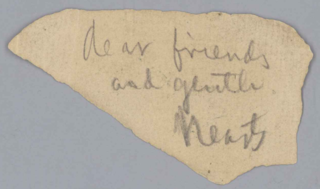
The Stephen Foster Collection and archives are the largest collection of primary source materials on the life and work of composer Stephen Foster. The collection consists of documents and other items of historical interest related to the life and work of Stephen Foster. It resides in the Stephen Foster Memorial at the University of Pittsburgh. Josiah K. Lilly donated an almost complete set of first edition music. The memorial houses sketchbooks and other memorabilia. The process of assembling the collection was methodical, well-organized and funded by various non-governmental and governmental sources. The cost of maintaining the collection is partially funded by the University of Pittsburgh.
References
- 1 2 3 About G. Robert Vincent Archived 2011-07-09 at the Wayback Machine , from the Vincent Voice Library at Michigan State University, published November 10, 2005, retrieved August 5, 2011
- ↑ Recorded Music in American Life: The Phonograph and Popular Memory, 1890-1945, by William Howland Kenney, Oxford University Press, 1999, via Google Books
- ↑ Victory Music, by Chuck Miller, originally published in Goldmine , February 1999; re-published at the Albany Times-Union, May 31, 2010; retrieved May 10, 2011
- ↑ Uncle Sam Goes Pop!, at BBC Radio 2, published 17 Aug 2009, retrieved May 10, 2011